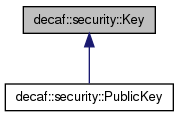The Key interface is the top-level interface for all keys. More...
#include <src/main/decaf/security/Key.h>

Public Member Functions | |
| virtual | ~Key () |
| virtual std::string | getAlgorithm () const =0 |
| Returns the standard algorithm name for this key. | |
| virtual void | getEncoded (std::vector< unsigned char > &output) const =0 |
| Provides the key in its primary encoding format, or nothing if this key does not support encoding. | |
| virtual std::string | getFormat () const =0 |
| Returns the name of the primary encoding format of this key, or an empty string if this key does not support encoding. | |
Detailed Description
The Key interface is the top-level interface for all keys.
It defines the functionality shared by all key objects. All keys have three characteristics:
An Algorithm
This is the key algorithm for that key. The key algorithm is usually an encryption or asymmetric operation algorithm (such as DSA or RSA), which will work with those algorithms and with related algorithms (such as MD5 with RSA, SHA-1 with RSA, Raw DSA, etc.) The name of the algorithm of a key is obtained using the getAlgorithm method.
An Encoded Form
This is an external encoded form for the key used when a standard representation of the key is needed outside the application, as when transmitting the key to some other party. The key is encoded according to a standard format (such as X.509 SubjectPublicKeyInfo or PKCS#8), and is returned using the getEncoded method. Note: The syntax of the ASN.1 type SubjectPublicKeyInfo is defined as follows:
SubjectPublicKeyInfo ::= SEQUENCE {
algorithm AlgorithmIdentifier,
subjectPublicKey BIT STRING }
AlgorithmIdentifier ::= SEQUENCE {
algorithm OBJECT IDENTIFIER,
parameters ANY DEFINED BY algorithm OPTIONAL }
For more information, see RFC 2459: Internet X.509 Public Key Infrastructure Certificate and CRL Profile.
A Format
This is the name of the format of the encoded key. It is returned by the getFormat method.
Constructor & Destructor Documentation
|
inlinevirtual |
Member Function Documentation
|
pure virtual |
Returns the standard algorithm name for this key.
For example, "DSA" would indicate that this key is a DSA key.
- Returns
- the name of the algorithm associated with this key.
|
pure virtual |
Provides the key in its primary encoding format, or nothing if this key does not support encoding.
- Parameters
-
output Receives the encoded key, or nothing if the key does not support encoding.
|
pure virtual |
Returns the name of the primary encoding format of this key, or an empty string if this key does not support encoding.
The primary encoding format is named in terms of the appropriate ASN.1 data format, if an ASN.1 specification for this key exists. For example, the name of the ASN.1 data format for public keys is SubjectPublicKeyInfo, as defined by the X.509 standard; in this case, the returned format is "X.509". Similarly, the name of the ASN.1 data format for private keys is PrivateKeyInfo, as defined by the PKCS #8 standard; in this case, the returned format is "PKCS#8".
- Returns
- the primary encoding format of the key.
The documentation for this class was generated from the following file:
- src/main/decaf/security/Key.h
